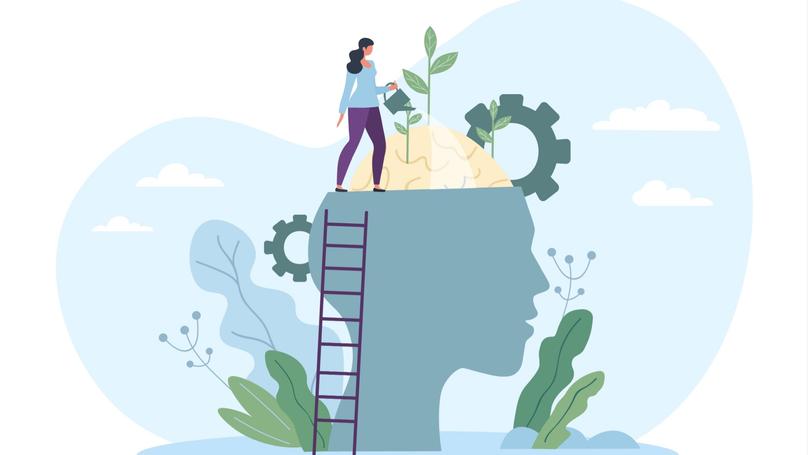Growth Mindset

What is a growth mindset?
A growth mindset is a unique concept that lacks a strict definition. Essentially, it suggests that any individual can achieve success in any area of endeavour if they apply enough effort. In essence, the growth mindset theory implies that our lives are not predetermined; instead, we can learn, develop, discover new talents, and even enhance skills that once seemed beyond our reach.
Carol Dweck, a Stanford psychologist and the author of "Mindset: The New Psychology of Success", is considered the founder of this theory. She explored how people react when confronted with complex tasks and life challenges. Dweck was intrigued by why some individuals seek quick solutions to problems while others tend to give up when faced with difficulties. Her research revealed that it all hinges on the thinking individuals possess.
The difference: Growth mindset vs fixed mindset
A growth mindset is characterised by the belief that any skill can be learned and that even abilities not initially present, such as a musical ear, can be developed. This mindset views the world as full of opportunities for improvement, where failures and mistakes are merely steps toward success. Also, a growth mindset aligns with the idea of life-long learning, which involves the continuous acquisition of new knowledge and skills. Together, life-long learning and a growth mindset represent a conscious way of life, focused on continual self-development, learning, mastering new skills, and developing various talents.
Conversely, a fixed mindset is the belief that our abilities are innate characteristics set in stone. It assumes that new talents cannot be developed because they do not initially exist. For instance, if you lack an inherent talent for physics, you will never become the next Einstein. According to this mindset, success in your profession is only achievable if you are born with certain tendencies towards it.
Another key difference between individuals with a growth mindset and those with a fixed mindset is their attitude toward failure. We have established that those who embrace a growth mindset are not scared of making mistakes or missing opportunities. For them, a mistake is a new experience and an important lesson. In contrast, individuals with a fixed mindset strive to avoid difficult tasks to prevent making mistakes and gaining what they perceive as negative experiences.
As a result, individuals with a growth mindset are always open to new things and can quickly adapt to changing situations. They are willing to leave their comfort zones, take responsibility, and face challenges. Conversely, those with a fixed mindset prefer to stay within their familiar boundaries and are not ready to accept challenges.
Likewise, individuals with a growth mindset are not ashamed to admit that they lack information or knowledge, and they can easily and comfortably ask for help. On the other hand, people with a fixed mindset tend to avoid doing this, as they fear appearing inadequately educated.
What makes a growth mindset so important?

Let's explore the advantages of a growth mindset and how embracing this view can transform your life:
-
It increases self-esteem - Individuals with a growth mindset tend to be more optimistic and satisfied with life, positively influencing their self-esteem. The belief is that dedicated effort and working hard on yourself can enhance particular skills and boost motivation, self-esteem, self-confidence, and overall abilities.
-
It proves that challenges are simply new opportunities in disguise. By embracing a growth mindset, you'll shift your outlook and no longer see challenges as insurmountable obstacles. Instead, each challenge becomes a chance for self-improvement and a valuable lesson where you will gain new knowledge.
-
It enables you to consciously embrace failures. Failures are a natural part of life, and adopting a growth mindset helps you understand that mistakes are inevitable. However, this shouldn't lead to despair or inaction. By recognising failures as crucial elements of your self-improvement journey, you can swiftly enhance your skills and overcome the fear of trying new things.
-
It emphasises the quality of learning. Growth thinking is inherently linked to the idea of lifelong learning, which means continuously acquiring knowledge and new experiences throughout your life. There's no need to hurry. A growth mindset prioritises the quality of development practices and the thorough mastery of skills, incorporating regular "lessons from mistakes," reflection, and scrutiny.
-
It eliminates the need for external validation. A growth mindset encourages you to focus entirely on your development, leaving no room for comparisons or seeking approval and praise from others.
-
It encourages an objective view of criticism. A growth mindset views criticism as an opportunity to learn more about yourself, gain new insights, and utilise them constructively. Instead of fearing criticism, it is beneficial to seek it out, remain curious, and ask experts in a particular field for their opinions on your work. While feedback may not always be flattering, even the harshest comments can assist you in improving and refining what needs attention.
-
Finally, it helps you embrace risk-taking. Throughout the journey of self-development, risks and choices are ever-present. By adopting a growth mindset, you will come to see these risks as essential components of a natural process of improvement.
Therefore, the advantages of a growth mindset are clear. By embracing this concept, you will find it easier to overcome obstacles and handle difficulties swiftly without experiencing psychological discomfort, pressure, or tension.
How do you develop a growth mindset?
A fixed mindset can be transformed through constant development. Over time, it will be replaced by a growth mindset, which also requires regular nurturing. To achieve this:
- Take charge of transforming your life. With a fixed mindset, you avoid trying new things. Therefore, the crucial first step is to discover your untapped potential. Stop limiting yourself-there are countless opportunities around you. If you don't take full responsibility for what happens in various areas of your life, the outcome will be left to chance. A growth mindset involves a responsible and conscious approach to yourself and your life. So, take control and don't delay pursuing your long-held dreams and aspirations and what you still doubt.
- Embrace everything new. Welcome changes in your life with happiness, and don't fear new things or surprises, as they add vibrancy to your life and enable you to live each day to the fullest. Be open to experiments, listen to different opinions, and view criticism constructively. The essence of growth thinking is that any changes, including difficulties and failures, are opportunities rather than obstacles.
- Practice mindfulness. Regularly examine your thoughts and reflect on your words and actions. To help this process, keep a mood diary where you record all the strong emotions and feelings you experience. When you notice an emotion, pause and describe it by answering questions like: "What exactly am I feeling right now?", "Why am I feeling this?", "How would I name and describe this feeling?", and "Do I like feeling this way or not, and why?" This practice will help you discover how to control your emotions rather than being controlled by them. We have already written more details about keeping a mood diary and other mindfulness practices here.
- Act and don't be afraid of mistakes. Believing in your success is not enough; it's crucial to give your all every day, do whatever it takes to achieve your goals, explore different options and paths, and never stop. Remember, a growth mindset is not an innate ability-it requires effort to develop. It may not happen immediately, but making mistakes is always better than doing nothing and procrastinating out of fear of failure.
- Cultivate good habits and eliminate bad ones. Establishing and maintaining positive habits will accelerate your mindset transformation, reinforce positive attitudes, enhance self-discipline, and boost motivation.
- Train your brain. Focusing on just one area isn't enough to fully utilise your brain's capabilities. People are capable of much more-you need to constantly challenge yourself, explore new directions, and develop abilities you've never paid attention to before. It's often said that a talented person is talented in everything. Outstanding scientists and public figures are typically well-rounded individuals. Therefore, regularly provide new stimuli for your mind and enrich your brain with diverse knowledge from various fields. This will not only broaden your horizons but also help you find unconventional solutions to problems, demonstrate creativity in any task, and quickly adapt to changes. You will learn how to train your brain further.
Exercises to develop a growth mindset

There are several straightforward and accessible methods to cultivate a growth mindset and cognitive flexibility. Here are a few:
- Engage in discussions and debates
If you have an opportunity to join a discussion on any topic, seize it. Don't be afraid to debate, ask questions, and seek an explanation. You can even channel your inner Socrates. The philosopher was famous for his habit of questioning everything and his catchphrase: "I know that I know nothing." Try to view situations from Socrates' perspective, approaching them with curiosity. Understand everything methodically and thoroughly and reflect on the information you receive.
Additionally, during debates or discussions, our brain rapidly transitions from processing information to formulating arguments and engaging in polemics. This process enhances rapid response skills, critical thinking, and overall mental flexibility.
- Do familiar things in a unique way
For instance, try different food for lunch each day, take alternate routes home from work, or listen to new playlists you've never heard before. This helps you break free from your routine, engage in mindfulness, and think about tasks you usually do automatically. Even activities like brushing your teeth or drawing with your non-dominant hand can stimulate the opposite hemisphere of your brain. This practice develops neuroplasticity by forming new neural connections through unfamiliar scenarios in daily life. Aim to practice this technique a few times a month, but don't overdo it-changing too many things at once can overwhelm your brain and cause unnecessary stress.
- Practice affirmations
This approach will help you reprogram your mind, replace negative beliefs and attitudes, and establish new patterns of thinking and behaviour. You can repeat affirmations like: "It's never too late to learn!", "It's okay if I fail, at least I'll try!", "Even if I fail, I will gain valuable experience", "I appreciate constructive criticism and am grateful for it", "The results of my actions do not define me as a person", "I don't need the approval of others, I am confident in what I do", etc. These affirmations will boost your confidence, help you focus on your main goal, and allow you to enjoy the process. This is crucial because if you focus solely on the results, you risk falling into a fixed mindset. Stay connected with reality and yourself, and pay attention to the details and methods that often go unnoticed.
- Cultivate and develop the art of active listening
This approach to enhancing cognitive flexibility involves maintaining an attentive and empathetic attitude towards others. When engaging in a conversation or debate, listen carefully to what the other person is saying, strive to understand their perspective, and avoid interrupting. Instead, ask follow-up questions, agree or gently persuade them. It's crucial to control the urge to interrupt, insert your comments, or judge their position before they finish speaking. Focus entirely on the speaker and their words. Additionally, observe their voice, tone, and facial expressions. Notice how their words and thoughts impact you and what emotions they evoke.
- Meet new people
Individuals from diverse social circles often hold varying outlooks on life. Engaging with such acquaintances can help you view problems from different angles, shift your viewpoint, empathise with others, and gain valuable experiences. To meet new people and build strong social connections, consider joining an interest club, volunteering, or even going on a hike.
- Employ various techniques to retain new information
Embracing a growth mindset means continuously learning new skills. To effectively retain information from various areas, employ multiple techniques. For instance, use spaced repetition and mnemonics, such as creating rhymes or abbreviations. When studying exact sciences or solving maths problems, utilise diagrams and different illustrations. Explore various memorisation methods to enhance your learning process here.
- Read more
You can discover ways to keep your brain in good shape and maintain its flexibility through practical manuals and books. For instance:
-
"Elastic: Flexible Thinking in a Constantly Changing World" by American physicist and science populariser Leonard Mlodinow explores the concept of elasticity in the human psyche, which refers to mental flexibility. The author delves into how this trait functions and what is required to develop it. This book is ideal for anyone interested in understanding mental and cognitive processes and learning how to manage their mental activity.
-
"Memory Palace Master: Over 70 Puzzles to Hone Your Powers of Observation and Recall" by Gareth Moore, PhD, is designed to train the brain. This collection includes numerous exercises for developing both short-term and long-term memory and techniques for faster information retention. The book is beneficial for children and teenagers, as well as for teachers in the classroom.
-
"My Plastic Brain: One Woman's Yearlong Journey to Discover If Science Can Improve Her Mind" by journalist Caroline Williams details her experience with various advanced memorisation methods, memory improvement techniques, and brain training. The author describes these techniques in simple language and discusses their proper use. Williams relied on scientific data and consulted with leading neurobiologists and psychologists, making this book suitable for adults or students in related fields of study.
Collectively, these methods will help you cultivate a growth mindset and mental flexibility. This will enable you to adapt swiftly to innovations and changing situations in the future, generate creative solutions to problems, come up with original ideas, rapidly develop various skills, appreciate your mistakes and failures, and approach everything with creativity. Dedicating just 15-20 minutes daily to the exercises mentioned above is sufficient to achieve this.
Examples of a growth mindset

Let's explore how a growth mindset manifests in various settings. Individuals with a growth mindset would never say, "I already know everything I need to be successful at work." This perspective is typical of those with a fixed mindset, while growth mindset supporters recognise its dangers. After all, if we don't develop, we stagnate. Consider Einstein-did he stop studying physics after formulating his theory? Absolutely not. That's why those with a growth mindset say, "I know there's still much I can learn."
In addition, the growth mindset can be characterised by the following phrases:
-
"Feedback isn't a criticism; it's an opportunity to learn and improve."
-
"Expanding your horizons and enhancing your skills is always beneficial."
-
"There are always ways to improve!"
-
"The achievements of others motivate me."
-
"Success is the result of effort and hard work."
-
"The journey is just as important as the destination."
Individuals with a growth mindset don't entertain thoughts like, "What's the point of trying if I'll fail anyway?" Instead, they believe, "It's always beneficial to try, as failures pave the way to success." Their motto, which applies to various aspects of life-from studies and work to personal life and hobbies-is succinctly captured in one important phrase: "It's never too late to learn!"
Conclusion
In today's rapidly evolving world, a growth mindset is indispensable. The ability to adapt quickly, generate new ideas, and continuously improve your skills is essential to stay relevant, advance in your career, and achieve your goals. A growth mindset forms the foundation for self-development. To cultivate this mindset, it's crucial to understand its essence, learn mindfulness and self-discipline, develop positive habits, and adopt the right attitude towards failures. While it may take several months to develop a growth mindset, it requires regular maintenance and cultivation. Best of luck on your journey!























